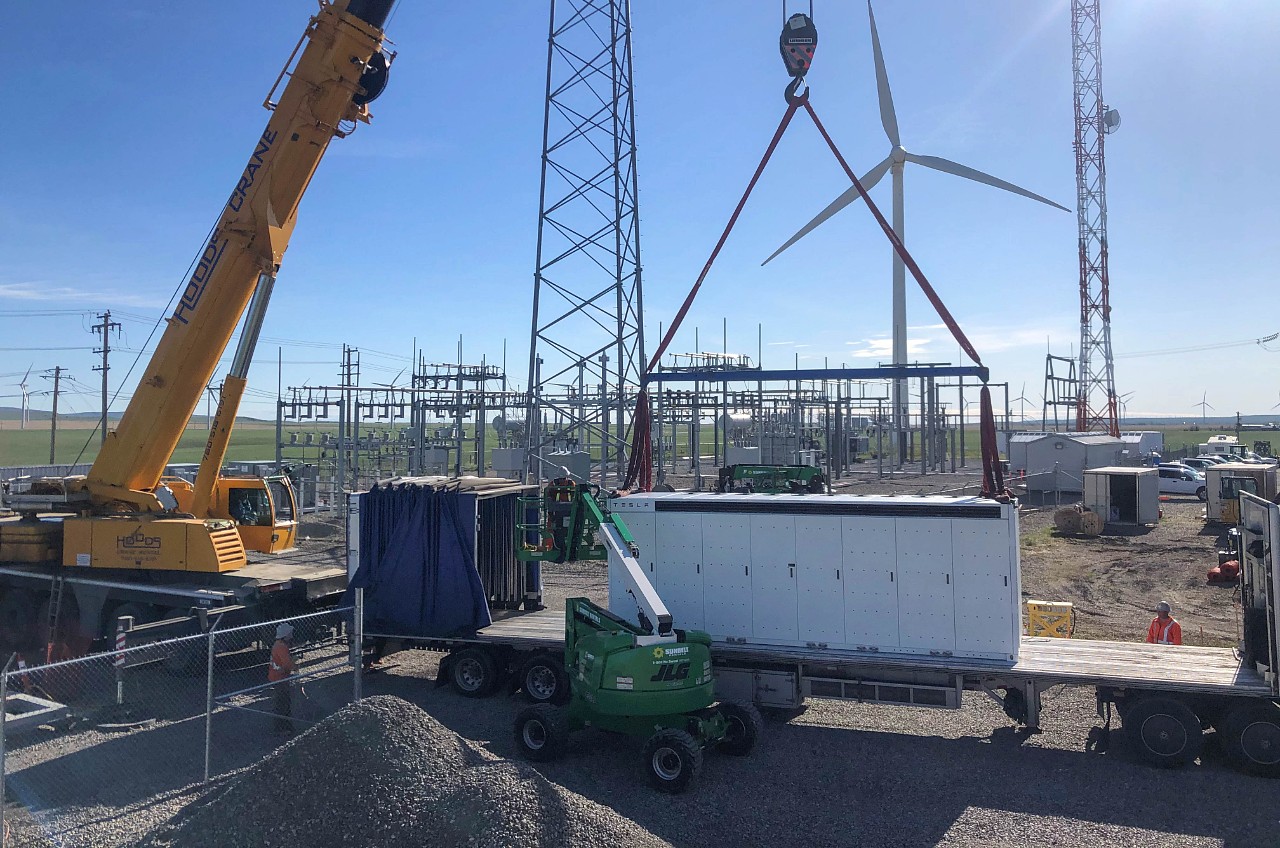
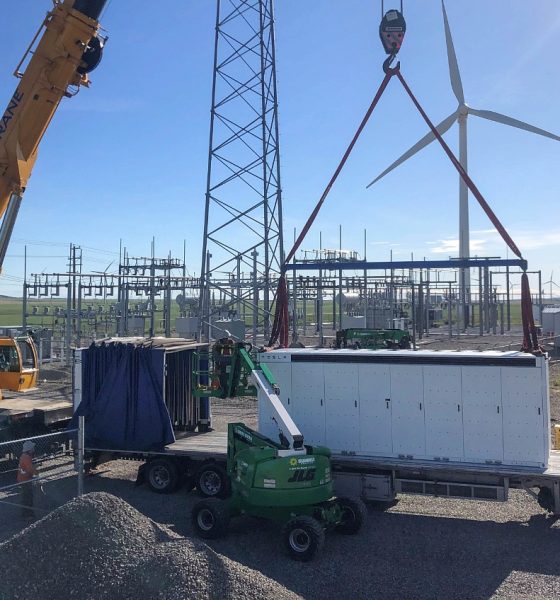
Energy
Tesla Megapacks help Alberta, Canada push towards sustainability
Tesla has unloaded Megapacks to a “Windcharger” in Canada, which will store massive amounts of energy from a large wind farm in the province of Alberta.
TransAlta owns the Windcharger project through its “wholly-owned subsidiary,” the Western Sustainable Power Corporation. According to TransAlta’s website, the company has been looking for an appropriate battery storage solution at its various wind farms throughout Canada for several years. Tesla’s energy storage business surely fits the bill.
The Summerview Wind Farm location was chosen to utilize Tesla Megapacks because of its “many desirable features, which are conducive to siting a battery storage facility of this nature,” TransAlta stated. It will be the first lithium-ion, utility-scale battery storage project in Alberta.
TransAlta’s WindCharger will be the first lithium-ion, utility-scale battery storage project in Alberta. It will utilize Tesla’s Megapack battery technology, charged with electricity from our Summerview Wind Farm. Learn more about WindCharger here, https://t.co/5d4kSabVTu pic.twitter.com/Hft8Y3mgy3
— TransAlta (@TransAlta) June 9, 2020
The Tesla Megapacks will have a nameplate capacity of 10 MW, with a total storage capacity of 20 MWh. Each Megapack has up to 3MWh of storage capacity.
The Alberta, Canada area has been pushing for sustainable energy use for several years, according to the province’s official website. Energy use has increased at a steady rate, along with population, and Alberta Electric System Operator (AESO) has implemented a series of competitive bidding processes to encourage renewable energy projects.
Alberta held three total rounds of bidding for various sustainable energy projects around the province, all of which would help local energy suppliers utilize geothermal, hydro, solar, sustainable biomass, or wind energy.
One of the projects from the third round of bidding was the TransAlta “Windcharger” project, which is also known as “Windrise.” The project was announced on December 17, 2018, and approved in November 2019. It is the second-largest sustainable energy project in Alberta at 207 MW. The only renewable energy project that holds more energy storage capability is a 248-MW wind farm owned by EDP Renewables Canada Ltd.
The project is valued at $22.7M and received funding from Emissions Reduction Alberta (ERA), who supplied the TransAlta windfarm with over $11.1M in financial assistance. “Wind and solar power is intermittent — turbines and solar panels only produce power when the wind is blowing, and the sun is shining,” ERA stated. “That poses challenges as renewable energy grows because the North American power grid was designed to draw power from large reliable sources that provide a consistent level of baseload power, like large hydro facilities and coal-fired generating stations. That’s why ERA is supporting renewable storage projects, like this initiative by TransAlta, that will test the world’s most advanced lithium-ion batteries made by Elon Musk’s Tesla Energy.”
One of the most significant advantages of Tesla’s Megapack is that it requires significantly less space and fewer parts than other energy storage systems on the market. Tesla stated, “At the site level, Megapack requires 40% less space and 10x fewer parts than current systems on the market. As a result, this high-density, modular system can be installed 10x faster than current systems.”
This allows for quick and easy installation and could mean more companies will opt for Megapacks as they will decrease the time needed to ramp a project. The Megapack systems are becoming more popular across the world.
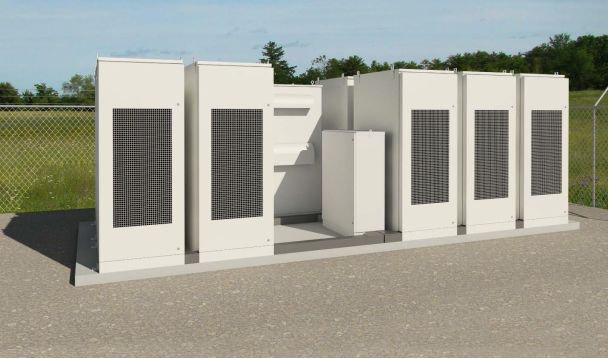
The 207-MW project owned by TransAlta will give enough energy to power around 80,000 homes, according to Alberta.ca. The project is planned to be operational by Summer 2021.
An exciting image from our WindCharger project in Southern Alberta of Tesla Megapack batteries being unloaded on site in late May. Once complete, WindCharger will have a nameplate capacity of 10 MW with total storage capacity of 20 MWh. #CleanEnergy pic.twitter.com/fikVQ5Msyf
— TransAlta (@TransAlta) June 3, 2020

Energy
Tesla meets Giga New York’s Buffalo job target amid political pressures
Giga New York reported more than 3,460 statewide jobs at the end of 2025, meeting the benchmark tied to its dollar-a-year lease.
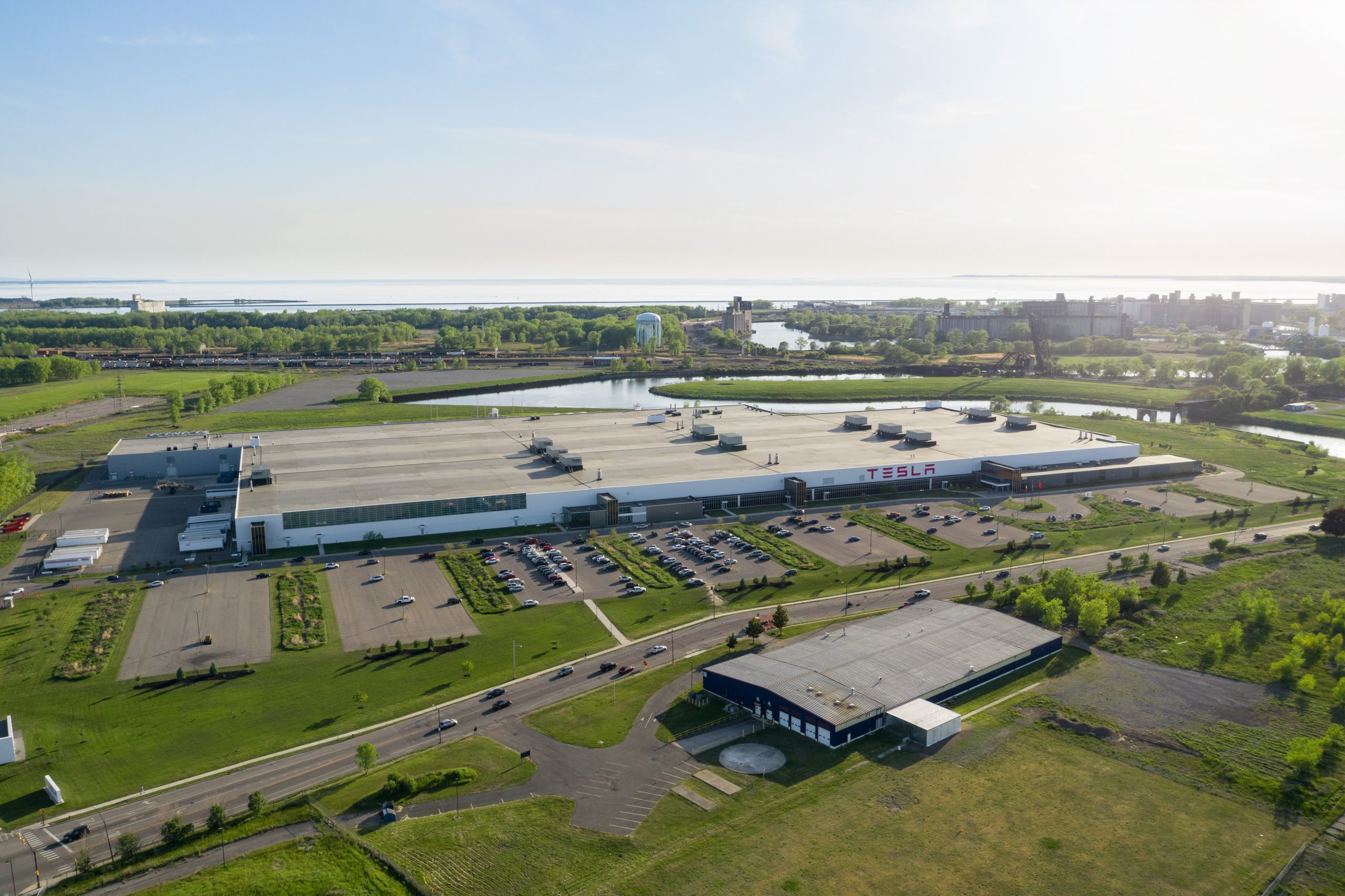
Tesla has surpassed its job commitments at Giga New York in Buffalo, easing pressure from lawmakers who threatened the company with fines, subsidy clawbacks, and dealership license revocations last year.
The company reported more than 3,460 statewide jobs at the end of 2025, meeting the benchmark tied to its dollar-a-year lease at the state-built facility.
As per an employment report reviewed by local media, Tesla employed 2,399 full-time workers at Gigafactory New York and 1,060 additional employees across the state at the end of 2025. Part-time roles pushed the total headcount of Tesla’s New York staff above the 3,460-job target.
The gains stemmed in part from a new Long Island service center, a Buffalo warehouse, and additional showrooms in White Plains and Staten Island. Tesla also said it has invested $350 million in supercomputing infrastructure at the site and has begun manufacturing solar panels.
Empire State Development CEO Hope Knight said the agency was “very happy” with Giga New York’s progress, as noted in a WXXI report. The current lease runs through 2029, and negotiations over updated terms have included potential adjustments to job requirements and future rent payments.
Some lawmakers remain skeptical, however. Assemblymember Pat Burke questioned whether the reported job figures have been fully verified. State Sen. Patricia Fahy has also continued to sponsor legislation that would revoke Tesla’s company-owned dealership licenses in New York. John Kaehny of Reinvent Albany has argued that the project has not delivered the manufacturing impact originally promised as well.
Knight, for her part, maintained that Empire State Development has been making the best of a difficult situation.
“(Empire State Development) has tried to make the best of a very difficult situation. There hasn’t been another use that has come forward that would replace this one, and so to the extent that we’re in this place, the fact that 2,000 families at (Giga New York) are being supported through the activity of this employer. It’s the best that we can have happen,” the CEO noted.
Energy
Tesla launches Cybertruck vehicle-to-grid program in Texas
The initiative was announced by the official Tesla Energy account on social media platform X.
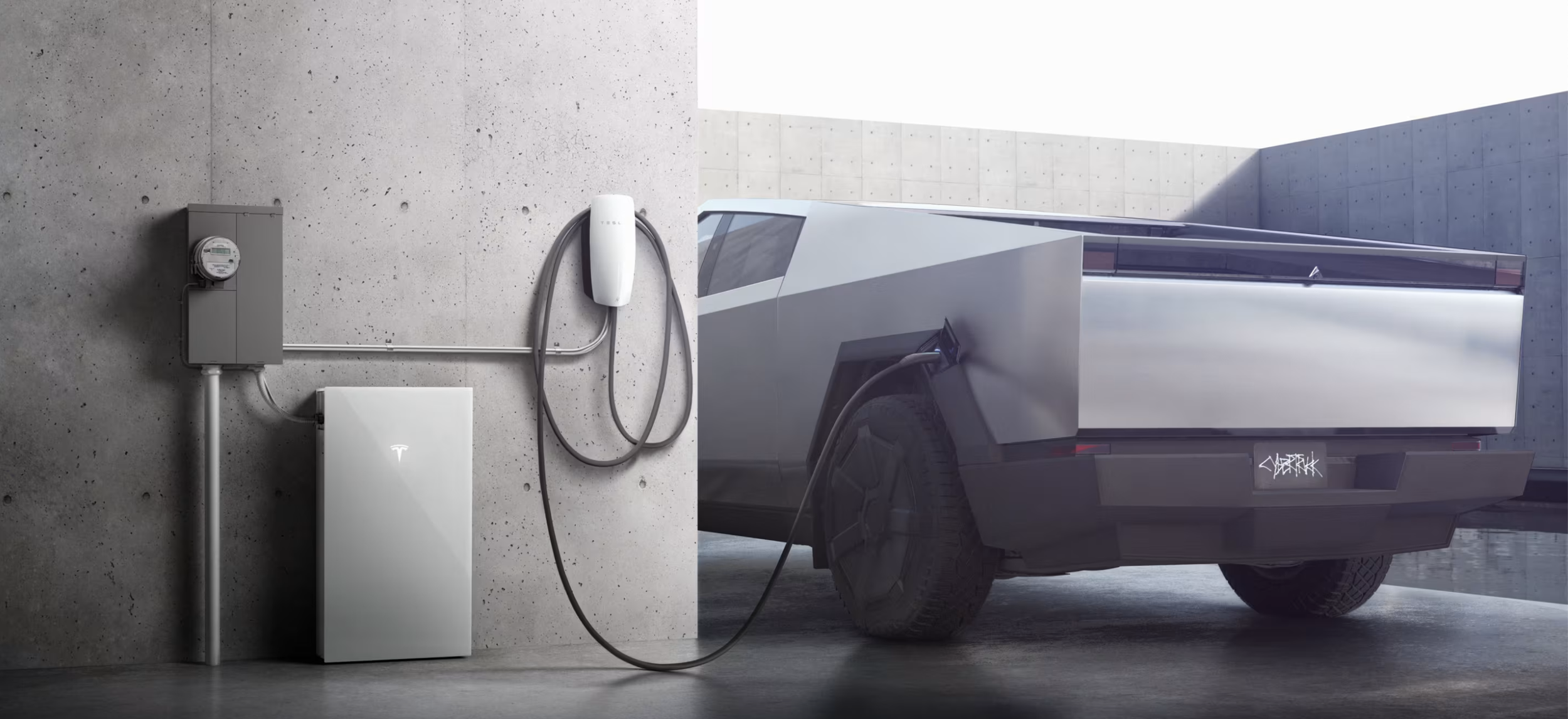
Tesla has launched a vehicle-to-grid (V2G) program in Texas, allowing eligible Cybertruck owners to send energy back to the grid during high-demand events and receive compensation on their utility bills.
The initiative, dubbed Powershare Grid Support, was announced by the official Tesla Energy account on social media platform X.
Texas’ Cybertruck V2G program
In its post on X, Tesla Energy confirmed that vehicle-to-grid functionality is “coming soon,” starting with select Texas markets. Under the new Powershare Grid Support program, owners of the Cybertruck equipped with Powershare home backup hardware can opt in through the Tesla app and participate in short-notice grid stress events.
During these events, the Cybertruck automatically discharges excess energy back to the grid, supporting local utilities such as CenterPoint Energy and Oncor. In return, participants receive compensation in the form of bill credits. Tesla noted that the program is currently invitation-only as part of an early adopter rollout.
The launch builds on the Cybertruck’s existing Powershare capability, which allows the vehicle to provide up to 11.5 kW of power for home backup. Tesla added that the program is expected to expand to California next, with eligibility tied to utilities such as PG&E, SCE, and SDG&E.
Powershare Grid Support
To participate in Texas, Cybertruck owners must live in areas served by CenterPoint Energy or Oncor, have Powershare equipment installed, enroll in the Tesla Electric Drive plan, and opt in through the Tesla app. Once enrolled, vehicles would be able to contribute power during high-demand events, helping stabilize the grid.
Tesla noted that events may occur with little notice, so participants are encouraged to keep their Cybertrucks plugged in when at home and to manage their discharge limits based on personal needs. Compensation varies depending on the electricity plan, similar to how Powerwall owners in some regions have earned substantial credits by participating in Virtual Power Plant (VPP) programs.
Cybertruck
Tesla updates Cybertruck owners about key Powershare feature
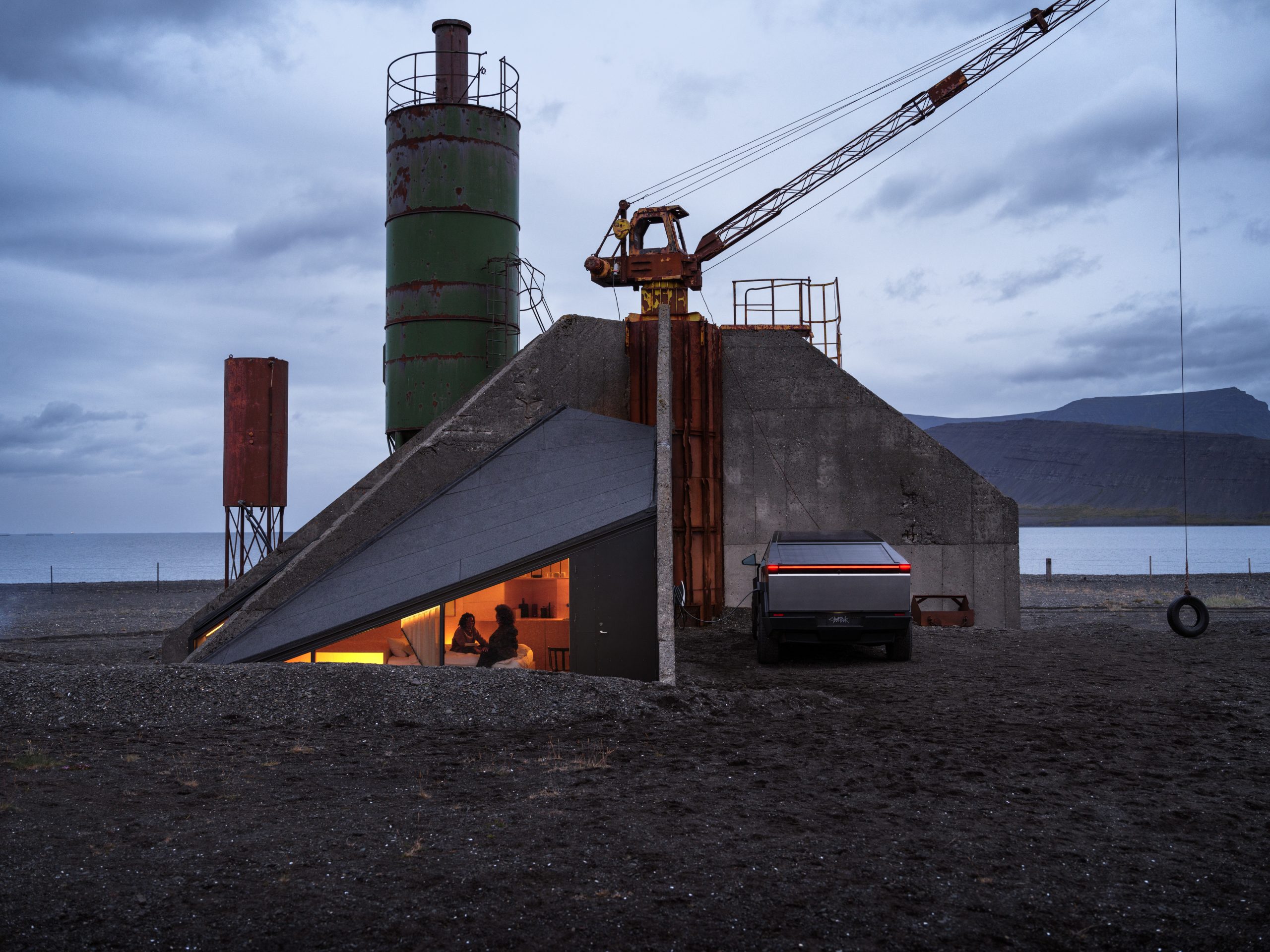
Tesla is updating Cybertruck owners on its timeline of a massive feature that has yet to ship: Powershare with Powerwall.
Powershare is a bidirectional charging feature exclusive to Cybertruck, which allows the vehicle’s battery to act as a portable power source for homes, appliances, tools, other EVs, and more. It was announced in late 2023 as part of Tesla’s push into vehicle-to-everything energy sharing, and acting as a giant portable charger is the main advantage, as it can provide backup power during outages.
Cybertruck’s Powershare system supports both vehicle-to-load (V2L) and vehicle-to-home (V2H), making it flexible and well-rounded for a variety of applications.
However, even though the feature was promised with Cybertruck, it has yet to be shipped to vehicles. Tesla communicated with owners through email recently regarding Powershare with Powerwall, which essentially has the pickup act as an extended battery.
Powerwall discharge would be prioritized before tapping into the truck’s larger pack.
However, Tesla is still working on getting the feature out to owners, an email said:
“We’re writing to let you know that the Powershare with Powerwall feature is still in development and is now scheduled for release in mid-2026.
This new release date gives us additional time to design and test this feature, ensuring its ability to communicate and optimize energy sharing between your vehicle and many configurations and generations of Powerwall. We are also using this time to develop additional Powershare features that will help us continue to accelerate the world’s transition to sustainable energy.”
Owners have expressed some real disappointment in Tesla’s continuous delays in releasing the feature, as it was expected to be released by late 2024, but now has been pushed back several times to mid-2026, according to the email.
Foundation Series Cybertruck buyers paid extra, expecting the feature to be rolled out with their vehicle upon pickup.
Cybertruck’s Lead Engineer, Wes Morrill, even commented on the holdup:
As a Cybertruck owner who also has Powerwall, I empathize with the disappointed comments.
To their credit, the team has delivered powershare functionality to Cybertruck customers who otherwise have no backup with development of the powershare gateway. As well as those with solar…
— Wes (@wmorrill3) December 12, 2025
He said that “it turned out to be much harder than anticipated to make powershare work seamlessly with existing Powerwalls through existing wall connectors. Two grid-forming devices need to negotiate who will form and who will follow, depending on the state of charge of each, and they need to do this without a network and through multiple generations of hardware, and test and validate this process through rigorous certifications to ensure grid safety.”
It’s nice to see the transparency, but it is justified for some Cybertruck owners to feel like they’ve been bait-and-switched.








